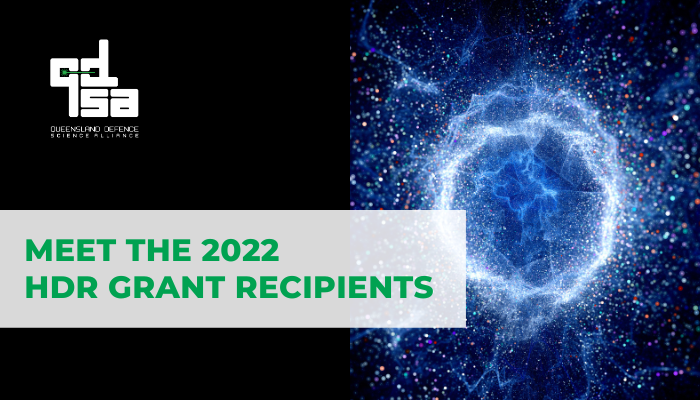QDSA is proud to continue its financial support of some of the state’s sharpest research minds.
Here are the six (6) recipients of our 2022 HDR Capability Grants program whose projects will see the initiation and development of Defence partnerships and capability advancement within academia spanning quantum, health, AI and hypersonics.
In 2022, we awarded HDR Capability Grants to these exceptional research candidates:
- Michael Hencz – Griffith University
- Gerard McNamara – Griffith University
- Alexander Zappacosta – Griffith University
- Morgan Van Hoffen – University of Southern Queensland
- Sherrilyn Walters – University of Southern Queensland
Michael Hencz – Griffith University
Project: Trapped Ion Quantum Communication Over Optical Fibres
In his research, Michael is exploring the use of UV photons emitted from trapped ion qubits for quantum communication. His goal is to convert these UV photons into telecom IR wavelengths and transmit them through a commercial long-distance optical fibre link. This innovative approach ensures secure communication that is immune to eavesdropping.
By harnessing the principles of quantum key distribution, which relies on the no-cloning theorem, Michael’s work guarantees that any attempt to intercept and reproduce the quantum information would disturb its inherent quantum properties.
This advancement in quantum communication has significant applications in the field of Defence, providing a highly secure means of transmitting sensitive information while safeguarding against unauthorized access and tampering.
Gerard Mcnamara – Griffith University
Project: Quantification of Wave Transformation Using Electromagnetic Sensing and Machine Learning
Gerard’s research is pioneering aims to create a mobile system that revolutionises the measurement of sub-surface hydrodynamics. By combining remote sensing technology, machine learning, radar, photo, and lidar, he’s developing an accurate and precise method for detecting sub-surface activity and vessel movement.
This innovative capability will have significant applications in defence, enabling enhanced maritime surveillance and bolstering Australia’s preparedness and understanding of coastal areas. By accurately determining bathymetry for coastal operations and vessel navigation, Gerard’s research ensures a comprehensive approach to safeguarding our coastlines and identifying vulnerabilities to sub-surface vessels.
Alexander Zappacosta – Griffith University
Project: Suspended Waveguides in Atomic Vapours – an Enabling Quantum Technology
Alexander’s research explores the applications of suspended photonic waveguides in detection electronics and transmission equipment.
By utilising microfabricated photonic devices, there is a possibility of replacing existing cryogenic sensors. One of the key advantages of these photonic devices is their improved SWaP-C (Size, Weight, Power and Cost) characteristics, with a compact, efficient, and low-cost design.
Alexander’s work represents a crucial step forward in the development of advanced, innovative, quantum solutions for the drone and subsea industries.
Luke Schmidt – Queensland University of Technology
Project: Blood Flow Restriction Training and the Generation of Neuroprotective
Peptides: A Future Stroke Treatment
Luke’s project is focused on the development of protocols that will revolutionise the detection and monitoring of neuroprotective and neurorepairative peptides generated by blood flow restriction training. This breakthrough will pave the way for the creation of cutting-edge wearable sensor detection technology and holds tremendous potential for training, deployment, and the rehabilitation of brain injuries and ischemic strokes.
By strategically manoeuvring and leveraging the ability to detect and monitor peptide levels in ADF personnel, it becomes possible to pre-emptively condition military individuals for heightened cognitive resilience, greatly improving mission success.
Luke’s project represents a significant step towards unlocking the full potential of neuroprotective peptides for the wellbeing of military personnel, veterans, and the public.
Morgan Van Hoffen – University of Southern Queensland
Project: Design and Simulation of Hypersonic Control Surfaces
Develop hypersonic wind tunnel testing capability for The University of Southern Queensland wind tunnel (TUSQ).
Morgan is leading groundbreaking research at USQ, in the field of aerospace engineering and hypersonic control surfaces. His focus is on developing a hypersonic wind tunnel testing capability for USQ’s wind tunnel.
Morgan’s research has the potential to revolutionise how students and researchers study hypersonic technology at USQ and beyond. Through his pioneering work, he is contributing to the development of safer, more efficient, and advanced control surfaces for hypersonic aircraft.
Sherrilyn Walters – University of Southern Queensland
Project: The Amplification of Biomechanical Force
Sherrilyn is a passionate martial artist and co-founder of the Chinese Martial Arts and Health Centre Australia in Toowoomba, has channelled her passion into groundbreaking research.
Sherrilyn’s project (in collaboration with USQ and MARTEL) focuses on the effects of traditional martial arts-based breath control training and how Defence can incorporate it to reduce injury when military personnel are carrying heavy loads and increase performance.
Through her work, Sherrilyn aims to shed light on the benefits of breathwork in enhancing physical capabilities and pushing the boundaries of human performance.
Queensland Defence research funding
Congratulations to the recipients of QDSA’s 2022 HDR Capability Grants.
Your dedication to research and commitment to advancing Defence capabilities is truly inspiring. QDSA is proud to support and empower the next wave of researchers and innovators, and we are excited to witness the impact you will make in the field.
Stay tuned for more updates and success stories as we celebrate the achievements of our 2022 HDR recipients.
QDSA Upcoming Events and Opportunities
QDSA has many upcoming events and opportunities, with more being added each week. Want to find out what is on the horizon? Check out our News section on our website here or subscribe to our e-newsletter here.
For real-time events and information, be sure to follow us on Twitter and LinkedIn.

The Queensland Defence Science Alliance (QDSA) is a university-led initiative to grow and connect an agile Defence innovation ecosystem, leveraging Queensland’s strengths, to deliver trusted solutions to meet Defence requirements.









